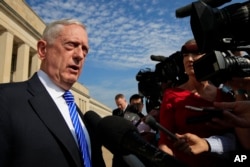U.S. President Donald Trump extended a word of gratitude to North Korean leader Kim Jong Un Friday for returning to U.S. authorities what are believed to be the remains of 55 U.S. service members who were killed in the Korean War more than six decades ago.
"I want to thank Chairman Kim for keeping his word," Trump told reporters outside the White House. "We have many others coming, but I want to thank Chairman Kim in front of the media for fulfilling a promise that he made to me and I'm sure he will continue to fulfill that promise as they search and search and search."
The transfer of the remains is the beginning of the fulfillment of an agreement reached between Kim and Trump during their historic Singapore summit last month.
About 7,700 U.S. soldiers are listed as missing from the Korean War, and 5,300 of the remains are believed to still be in North Korea.
U.S. Defense Secretary James Mattis told reporters at the Pentagon Friday the return of the remains may help remove a cloud of uncertainty that some grieving families have been forced to grapple with for decades.
"We have families that ... have never had closure. They've never gone out and had the body returned, so what we're seeing here is an opportunity to give those families closure, to make certain that we continue to look for those remaining."
The White House said Thursday that a U.S. military plane transporting the remains departed Wonsan, North Korea. The plane landed Friday morning at Osan Air Base near the South Korean capital of Seoul, where the White House said a formal repatriation ceremony will be held on August 1.
The remains will be transferred from the base to the Defense POW/MIA Accounting Agency in Hawaii, where forensic work will be done to identify them.
Friday (June 27) marks the 65th anniversary of the signing of the armistice that ended the 1950-53 war that split the communist North and the democratic South.
The remains were the first returned to the U.S. since a joint U.S.-North Korean effort between 1996 and 2005 recovered what were believed to have been the remains of 220 U.S. soldiers.
Since then, U.S. efforts to bring more American service members home have been slowed due to escalating tensions over North Korea's nuclear weapons and missile programs.
White House Bureau Chief Steve Herman and Pentagon correspondent Carla Babb contributed to this report.






